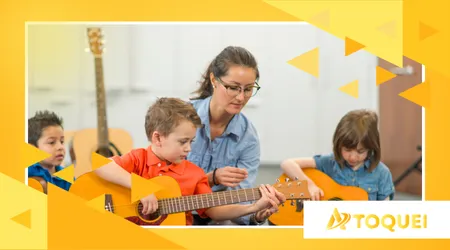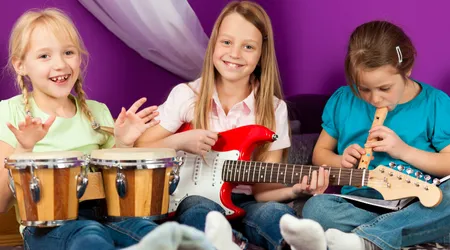Family Music: How Parents and Children Can Play Together

The sound of tuned instruments, united voices, and family music echoing throughout the house is a melody in itself, capable of transforming the environment and bringing hearts closer together.
Advertisements
The shared musical practice between parents and children transcends mere entertainment, becoming a valuable tool in child development and in building solid relationships.
This sound connection provides a space for mutual learning, where generations can exchange experiences and knowledge.
Patience, active listening, and collaboration flourish naturally in this creative environment.
Learning an instrument together, or even singing in a choir, encourages discipline and perseverance. The path to mastering a new melody is paved with challenges, overcome together.
Advertisements
The Multifaceted Benefits of Family Musical Synergy
THE family music goes far beyond the simple pleasure of playing. It nurtures cognitive, emotional, and social skills in an integrated way.
Playing together stimulates fine and gross motor coordination, memory, and concentration. The mind becomes more agile when deciphering sheet music and rhythms.
Language development is also boosted, especially through learning song lyrics and vocal expression. Singing stimulates diction and intonation.
Expressing feelings finds a safe and healthy outlet. Music allows us to express joys, sadness, and frustrations constructively.
Read more: The Story of Noah's Ark Musical: How to Create a Children's Show
Choosing Instruments: A Journey of Joint Discovery
The selection of the ideal instruments for the family music should consider the age, interests, and aptitudes of each member. There is no one-size-fits-all formula, but rather an invitation to exploration.
Options like the keyboard, electric guitar, or ukulele are often accessible and versatile for beginners. They offer a rewarding learning curve.
Percussion, with its rhythmic and intuitive nature, can also be a fun gateway for younger children. Drums, rattles, and xylophones delight from an early age.

Sometimes the simplest instrument, like one's own voice, is enough to begin this shared musical journey. A cappella singing has its own particular charm.
The electronic drum kit, for example, allows parents and children to explore complex rhythms without disturbing the neighbors, a welcome innovation.
A study published in the journal Frontiers in Neuroscience in 2021 highlighted that collective musical practice in families can improve emotional regulation in children and adolescents.
This demonstrates the profound impact this activity can have.
++ Top 10 Easy Musical Instruments for Kids 6 and Under
Strategies to Keep the Melody Flowing in Your Daily Life
Integrate the family music into your routine requires a bit of planning, but the results are worth the effort. The key is flexibility and fun.
Setting regular practice times, even short ones, helps create a consistent habit. Small moments dedicated to music make a big difference.
Turning learning into a game, with challenges and rewards, maintains engagement, especially among children. Gamification can be an ally.
++ How to Use Children's Songs to Work on Notes and Pitch
Sharing the stage, even if it's just the living room rug, strengthens the sense of belonging and cooperation. Everyone has an important role.
A family decided to learn children's songs on the ukulele. Initially hesitant, the parents discovered a new hobby and connected with their children in a playful and musical way.
The repertoire can range from popular to classical, including soundtracks from beloved films. Diversity keeps the interest alive.
As confidence grows, families can explore more complex arrangements and even compose their own songs. Creativity has no limits.
In another family, the father plays the guitar and the youngest daughter learned to sing. Together, they created homemade performances of songs that marked the father's childhood, creating new fond memories.
Technology also offers valuable resources, such as music learning apps and virtual performance sharing platforms. Connection transcends physical barriers.
The analogy of family music with cooking it is pertinent: just as a well-executed recipe requires quality ingredients and harmony between flavors, a successful family jam session depends on the dedication of each person and the synchronization between the instruments and voices.
++ Learning to play guitar with your children: discover 6 reasons
Overcoming Challenges and Celebrating Achievements
The family's musical journey isn't always without obstacles. Moments of frustration or demotivation may arise, but they are opportunities for growth.
It's crucial that parents encourage, without overly pressuring, the pursuit of perfection. The learning process is more important than the end result.
Celebrating each small achievement, such as learning a new note or completing a song, reinforces motivation and enjoyment of the activity. Recognition is a powerful motivator.
Open communication about each person's difficulties and concerns helps maintain harmony, both musically and familially.
Remember that the main goal is connection and shared joy. family music it is a celebration of life.
Music as a Lasting Legacy
Invest time in family music is to build an intangible heritage of inestimable value. These are experiences that shape character and create indestructible bonds.
Learning to play an instrument, or simply singing along, is a skill that can stay with individuals throughout their lives, offering comfort, expression, and joy.
This shared musical journey, filled with learning and laughter, becomes a special chapter in each family's story.
May the melody of home continue to resonate, strengthening bonds and inspiring new generations to discover the magic of music.
Frequently Asked Questions
Which instruments are easiest for beginners in the family?
Instruments like the keyboard, guitar, ukulele, and percussion instruments like the xylophone are often great starting points because they offer a more accessible learning curve and are versatile.
Do you need musical experience to start?
No, musical experience is not a prerequisite. Many families learn together from scratch, sharing the process of discovery and development.
The important thing is the desire to learn and connect.
How to keep children motivated to practice?
Making exercise fun through games, setting achievable goals, and celebrating achievements, even small ones, are effective strategies. Avoid pressure and focus on the enjoyment of the activity.
Are there online resources to help with family learning?
Yes, there are a wide range of online resources, including video tutorials, interactive music learning apps, and platforms that offer sheet music and exercises.
